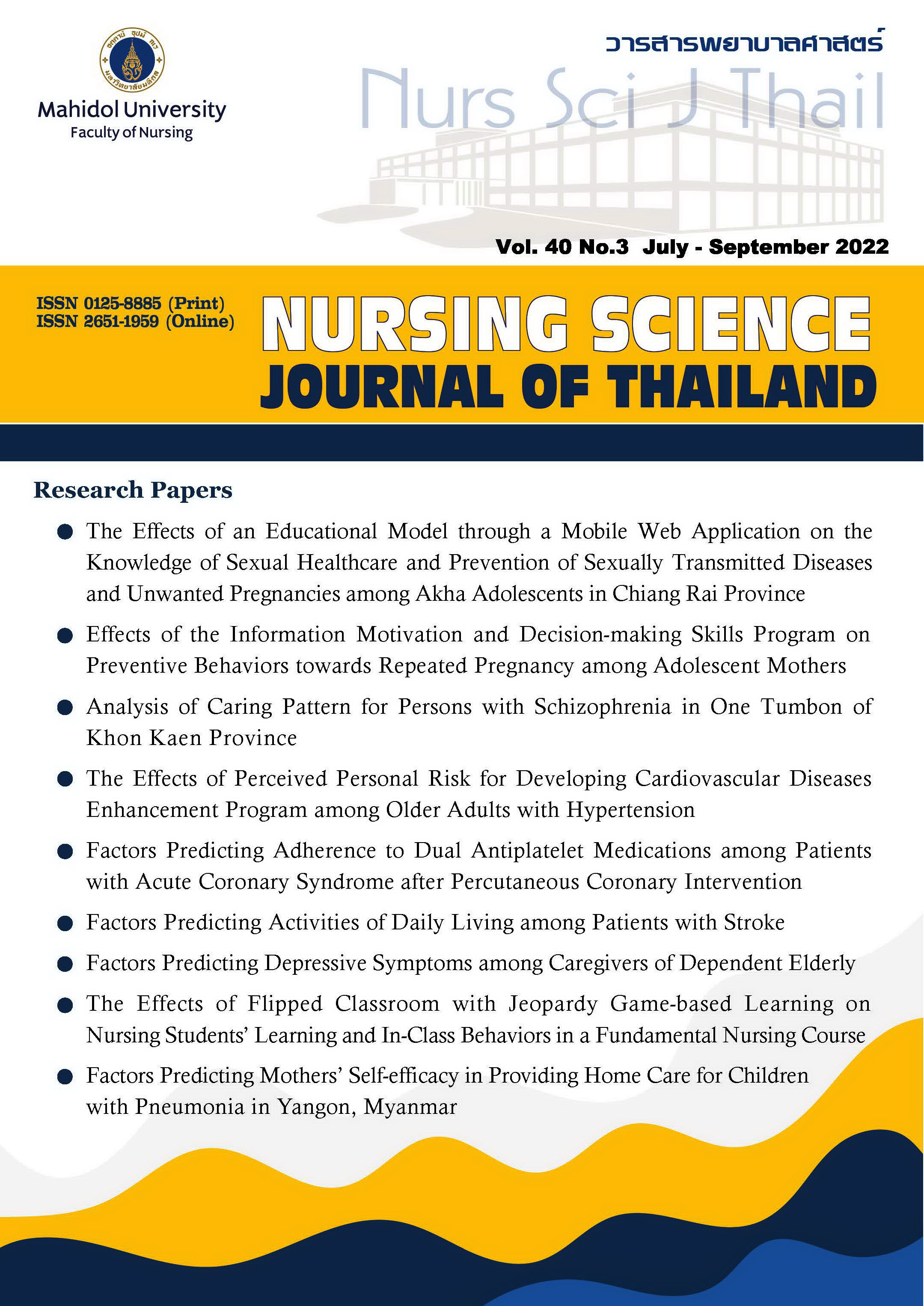The Effects of Perceived Personal Risk for Developing Cardiovascular Diseases Enhancement Program among Older Adults with Hypertension
Main Article Content
Abstract
Purpose: To study the effects of a perceived personal risk for developing cardiovascular diseases enhancement program among older adults with hypertension.
Design: Quasi-experimental research design.
Methods: Seventy older adults with hypertension were divided into the experimental and control groups with 35 each who received service at the health promoting hospital. The experimental group received perceived personal risk for developing cardiovascular diseases enhancement program for 12 weeks which comprised cardiovascular risk assessment, hypertension-related complications education, risk management education, and motivation interviewing during the home and telephone visits. Data regarding blood pressure, perceived risks of cardiovascular diseases, and preventive behavior for cardiovascular diseases were collected before and after the program. Data were analyzed using descriptive statistics and t-test.
Main findings: The results revealed that the experimental group had significantly higher scores of perceived risks for developing cardiovascular diseases and preventive behavior for cardiovascular disease at post program than that at pre-program (p < .001) and that in the control group (p < .001). The experimental group had significantly lower blood pressure at post program than that at pre-program (p < .001) and that in the control group (p < .05).
Conclusion and recommendations: An appropriate perceived personal risk for developing cardiovascular diseases helps hypertensive older adults to manage their risk and perform preventive behavior. Thus, the nurses could play an important role in giving information and promoting an appropriate perception of personal risk among hypertensive older adults.
Article Details

This work is licensed under a Creative Commons Attribution-NonCommercial-NoDerivatives 4.0 International License.
Copyright Notice: Nursing Science Journal of Thailand has exclusive rights to publish and distribute the manuscript and all contents therein. Without the journal’s permission, the dissemination of the manuscript in another journal or online, and the reproduction of the manuscript for non-educational purpose are prohibited.

Disclaimer: The opinion expressed and figures provided in this journal, NSJT, are the sole responsibility of the authors. The editorial board bears no responsibility in this regard.
References
Buford TW. Hypertension and aging. Ageing Res Rev. 2016;26:96-111. doi: 10.1016/j.arr.2016.01.007.
Foundation of Thai Gerontology Research and Development Institute. Situation of the Thai elderly 2016. Nakhon Pathom: Printery Company Limited; 2019. 132 p. (in Thai).
Mae On District Public Health Office. Annual report 2020. Chiang Mai: Public Health Office; 2020. 280 p. (in Thai).
Fuchs FD, Whelton PK. High blood pressure and cardiovascular disease. Hypertension. 2019;75(2):285-92. doi: 10.1161/HYPERTENSIONAHA.119.14240.
Anantasaran D. Effects of health care promoting program on self-care behavior and blood pressure level among older adults with uncontrolled hypertension in Langsuan Municipality, Chumporn Province. Region 11 Medical Journal. 2016; 30(4):299-311. (in Thai).
Mohd Azahar NMZ, Krishnapillai ADS, Zaini NH, Yusoff K. Risk perception of cardiovascular diseases among individuals with hypertension in rural Malaysia. Heart Asia. 2016;9(2):e010864. doi: 10.1136/heartasia-2016-010864.
Lee E, Park E. Self-care behavior and related factors in older patients with uncontrolled hypertension. Contemp Nurse. 2017;53(6):607-21. doi: 10.1080/10376178.2017.1368401.
Rouyard T, Kent S, Baskerville R, Leal J, Gray A. Systematic review or meta-analysis perceptions of risks for diabetes-related complications in type 2 diabetes populations: a systematic review. Diabet Med. 2017;34(4):467-77. doi: 10.1111/dme.13285.
Mitra M, Wulandari W. Factor affecting uncontrolled blood pressure among elderly hypertensive patients in Pekanbaru city, Indonesia. Open Access Maced J Med Sci. 2019;7(7):1209-13. doi: 10.3889/oamjms.2019.255.
Sanprakhon P, Chusri O, Wongwisadkul S. The effects of health belief application program in older adults with risk of coronary artery disease in a community. Nursing Journal of the Ministry of Public Health. 2018;28(3):87-100. (in Thai).
Singco T, Changmai S, Toskulkao T. The effects of promoting perception of health beliefs program on stroke prevention behaviors and perceived benefit of sustained behaviors in elderly at risk. Journal of Charoenkrung Pracharak Hospital. 2020;16(2):42-60. (in Thai).
Tiparat W, Suwanweala S, Sumrit W. The effects of self-awareness development program on stroke prevention behaviors among hypertension patients in Muang District, Trang province. The Southern College Network Journal of Nursing and Public Health. 2017;4(2):94-107. (in Thai).
Rosenstock IM. Historical origins of the Health Belief Model. Health Educ Monogr. 1974;2(4):328-35. doi: 10.1177/109019817400200403.
Festinger L. A theory of social comparison processes. Hum Relat. 1954;7(2):117-40. doi: 10.1177/001872675400700202.
Miller WR, Rollnick S. Motivational interviewing: preparing people to change addictive behavior. 2nd ed. New York: Guilford Press; 2002. 449 p.
Polit FD, Hungler PB. Nursing Research: principle and methods. 6th ed. Philadelphia: Lippincott; 1999. 757 p.
Cohen J. Quantitative methods in psychology: a power primer. Psychol Bull. 1992;112(1):155-9.
Kongprasert J, Watcharasin S, Punmung N. Cardiovascular risk assessment in diabetes and hypertensive patients [Internet]. Nonthaburi: The Agricultural Co-operative Federation of Thailand Printing Press; 2015 [cited 2021 Jun 9]. Available from: http://110.164.147.155/kmhealth_new/Documment/diabetes/knowledge/5.pdf. (in Thai).
Lipkus IM, Kuchibhatla M, McBride CM, Bosworth HB, Pollak KI, Siegler IC, et al. Relationships among breast cancer perceived absolute risk, comparative risk, and worries. Cancer Epidemiol Biomarkers Prev. 2000;9(9):973-5.
Sutthipatthanangkoon C, Thato R. Factors predicting preventive behaviors for coronary artery disease among autonomous university staff in Bangkok. Thai Journal of Cardio-Thoracic Nursing. 2017;28(2):111-25. (in Thai).
Pragodpol P, Intana J. The effect of the stroke warning signs program on stroke’s awareness, knowledge, and practice to decrease the stroke risk in hypertensive patients. Journal of Phrapokklao Nursing College. 2019;30(2):88-100. (in Thai).
Likhitluecha N, Atthachaiwat A, Wongsuvansiri S, Sathira-angkura T, Leelawong S. Development of care management model for patients with uncontrolled diabetes. Journal of Nursing Division. 2017;44(2):141-58. (in Thai).
Chaipet N, Kaewklum U, Sonrat S, Wittayapun Y. Non Communicable Diseases (NCD’s) high risk patients: effectiveness of a health behaviors changing programs on health behavior in Suratthani. The Southern College Network Journal of Nursing and Public Health. 2017;4(2):45-62. (in Thai).
Plaiyod J, Panpakdee O, Taikerd C. Effects of a promoting self-care participation program on perceived self-care ability, body weight, and blood pressure control in persons with hypertension. Ramathibodi Nursing Journal. 2012;18(2):223-36. (in Thai).
Thongtang P, Seesawang J. Lived experience among hypertensive older people. Nursing Journal. 2014;41 Suppl:1-10. (in Thai).


